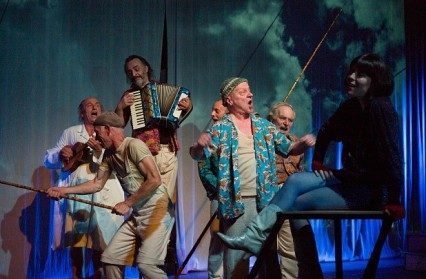Gary Raymond reviews whether Jack Nicholson’s iconic portrayal of Randle p McMurphy in One Flew Over the Cuckoo’s Nest has been lived up to in this Footsbarn Travelling Theatre Company production.
There are some roles that become so associated with one actor – one performance, even – that the creative afterlife of that character can be forever poisoned for anyone else who tries it. When Jack Nicholson took on the part of Randle P McMurphy in Milos Foreman’s screen version of Ken Kesey’s sublime novel, One Flew Over the Cuckoo’s Nest, in 1975, he did such a thing. The Seventies was the decade in which Nicholson created his legend – much like Pacino and De Niro – and McMurphy was perhaps his finest hour. One way to follow on from that is to try and slide into the skin that has been left behind, add your own shades from the inside. Christian Slater did it extremely well a few years ago on stage, doing, in part, an impression of Nicholson – widow’s peak and mischievous grin in place – and part re-interpretation of the slightly menacing figure in the novel. The other way is to completely re-interpret the role. Paddy Fletcher, in this chaotic and largely formless dreamlike version from Footsbarn’s Travelling Theatre, went head over heels for the latter, and his camp, moist-mouthed Del Boy Trotter was ultimately, disappointingly unconvincing. McMurphy, in Kesey’s novel, is the World War Two hangover working class of America’s demobbed post-victory parade thirty-somethings of the 1950s, spat out by the bypassing of them of the American Dream. McMurphy is bitter, he is demanding, part of him wants to watch the world burn, part of him wants what he thinks he has been promised. But in Fletcher we have a wide boy who is as annoying as he is small time.
It may seem nit-picking, but unfortunately for this warm and well-meaning interpretation, the failure to cast or characterise McMurphy with any vigour or sense of real danger pulls everything else down with it. There is no bathos in Billy’s tragedy, no sense of nobility to Chief Bromden’s predicament, and McMurphy’s own demise is played out like a Carry On gag. The central drama in the story, that between McMurphy and the infernal Nurse Ratched is rendered entirely moot. As symbols of authority versus revolt, here the two are as imposing as the patients who have undergone too much electric-shock therapy.
But let’s not let lose sight of what this production has sought to do. It is often quasi-absurdist, and in some parts is riotously enjoyable. Haris Resic is an imposing Chief, and the puppetry and fantasy is extremely likeable. And masks, live music, sweeping curtains and a general cartoon atmosphere may very well have given someone unfamiliar with the power and emotion of the book, film or stage play a memorable, if bizarre, night in the theatre. But One Flew Over the Cuckoo’s Nest is one of the finest American stories of the latter half of the twentieth century (this version was entirely rootless, which was part of the problem) in all its forms, and this production felt like a shortfall rather than a left turn. Huge, important plot strands were lost as the Chief’s voice-over was often inaudible. And as McMurphy slopped more and more from his Del Boy origins to an Uncle Albert semi-retirement before our eyes, it seemed that much of the importance of the story would have been lost on newcomers to it. If it was asylum chaos Footsbarn wanted to play around with, they might have had more success with Marat/Sade. … Cuckoo’s Nest sadly, revels in its quietest moments.
Footsbarn have a wonderful reputation for pantomimic dreamlike excess, but the characters of One Flew Over the Cuckoo’s Nest perhaps deserved a little more theatre and a little less circus.
Banner image courtesy of Footsbarn Travelling Theatre Company
Footsbarn Travelling Theatre Company
Wales Millennium Centre, Roald Dahl Plas



 Enjoyed this article? Support our writers directly by buying them a coffee and clicking this link.
Enjoyed this article? Support our writers directly by buying them a coffee and clicking this link.








